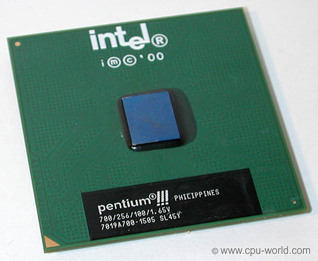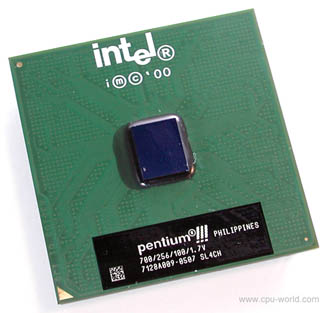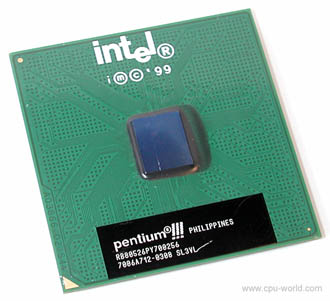Intel Pentium III 700 MHz specifications
| General information |
| Type | CPU / Microprocessor |
| Market segment | Desktop |
| Family | Intel Pentium III |
| CPU part numbers |
- RB80526PY700256 is an OEM/tray microprocessor
- BX80526F700256 is a boxed microprocessor
- BX80526F700256E is a boxed microprocessor
|
| Frequency ? | 700 MHz |
| Bus speed ? | 100 MHz |
| Clock multiplier ? | 7 |
| Package | 370-pin Flip-Chip Pin Grid Array (FC-PGA)
1.95" x 1.95" (4.95 cm x 4.95 cm) |
| Socket | Socket 370 / PGA370 |
| Introduction date | Oct 25, 1999 |
| Price at introduction | $754 |
| S-spec numbers |
| Part number |
ES/QS processors |
|---|
| |
QM45 |
QS71 |
| BX80526F700256 | | |
| BX80526F700256E | | |
| RB80526PY700256 | + | + |
| |
| Part number |
Production processors |
|---|
| |
SL3T3 |
SL3VL |
SL3XX |
SL45Y |
SL4CH |
SL4M7 |
SL4ZM |
| BX80526F700256 | + | | | + | | + | |
| BX80526F700256E | + | + | + | | + | | |
| RB80526PY700256 | + | + | + | + | + | | + |
|
| Architecture / Microarchitecture |
| Microarchitecture | P6 |
| Processor core ? | Coppermine |
| Core steppings ? | cA2 (QM45, SL3T3, SL3VL)
cB0 (QS71, SL3XX, SL45Y)
cC0 (SL4CH, SL4M7)
cD0 (SL4ZM) |
| CPUIDs | 681 (SL3T3, SL3VL)
683 (SL3XX, SL45Y)
686 (SL4CH, SL4M7)
68A (SL4ZM) |
| Manufacturing process | 0.18 micron
28 million transistors |
| Die | 104.6mm2 (CPUID 0683h)
90mm2 (CPUID 0686h)
94.7mm2 (CPUID 068Ah) |
| Data width | 32 bit |
| Data bus width | 64 bit |
| The number of CPU cores | 1 |
| The number of threads | 1 |
| Floating Point Unit | Integrated |
| Level 1 cache size ? | 16 KB 4-way set associative instruction cache
16 KB 4-way set associative data cache |
| Level 2 cache size ? | Full-speed integrated 8-way set associative 256 KB |
| Multiprocessing | Up to 2 processors |
| Extensions and Technologies | - MMX instructions
- SSE / Streaming SIMD Extensions
|
| Low power features | - AutoHALT state ?
- Stop Grant state ?
- Sleep state ?
- Deep Sleep state ?
- System Management Mode
|
| Electrical / Thermal parameters |
| Min/Recommended/Max V core | 1.57V / 1.65V / 1.69V
1.62V / 1.7V / 1.74V
1.67V / 1.75V / 1.79V |
| Minimum/Maximum operating temperature ? | 0°C - 80°C |
| Maximum power dissipation ? | 23.8 Watt (1.7V core)
25.9 Watt (1.75V core) |
| Thermal Design Power ? | 18.3 Watt (CPUID 0686h)
21.9 Watt (CPUID 068Ah) |
| Notes on Intel Pentium III 700 MHz |
- The processor is usually marked as 700/256/100/1.65V, 700/256/100/1.7V or 700/256/100/1.75V,
where the last number specifies processor's core voltage. If the
processor is marked with RB80526PY700256 part number then use processor
specification number to identify processor's core voltage
- Stepping cA2 CPUs for Socket 370 were not validated for dual-processing
|
Detailed side-by-side comparison
Pentium III 700 MHz Overclocking
Sorry, we do not have overclocking data for this Intel Pentium III microprocessor at this time.
CPU ID information for the Pentium III 700 MHz
Detailed characteristics of processor's internals, including x86
instruction set extensions and individual instructions, high- and low-level
technologies, are listed below. This list was acquired from an actual
Intel Pentium 3 700 processor with the help of the x86 CPUID instruction. Any
discrepancies between CPUID features and official specifications are
likely due to some features being disabled in BIOS, or due to a bug in
our CPUID decoding algorithm.
Different steppings of Intel processors may also have slightly different features.
Search or browse all public submissions in our CPUID database.
Use our CPU identification tool to check features of your processor.
| Submission details |
|---|
| Manufacturer: | Intel | Measured frequency: | 701 MHz |
| CPU Family: | Pentium 3 | Comment: | |
| Processor Number: | 700 | |
| Part number (supplied): | RB80526PY700256 | Submitted by: | Neon |
| Part number (guessed): | RB80526PY700256 | Submitted on: | |
| S-Spec Number: | SL3XX | CWID version: | 0.2 |
General information
| Vendor: | GenuineIntel |
| Processor type: | Original OEM Processor |
| CPUID signature: | 683 |
| Family: | 6 (06h) |
| Model: | 8 (08h) |
| Stepping: | 3 (03h) |
| TLB/Cache details: | Data TLB: 4-KB Pages, 4-way set associative, 64 entries
Data TLB: 4-MB Pages, 4-way set associative, 8 entries
Instruction TLB: 4-KB Pages, 4-way set associative, 32 entries
Instruction TLB: 4-MB Pages, fully associative, 2 entries |
Cache details
| Cache: |
L1 data |
L1 instruction |
L2 |
|---|
| Size: |
16 KB |
16 KB |
256 KB |
| Associativity: |
4-way set
associative |
4-way set
associative |
8-way set
associative |
| Line size: |
32 bytes |
32 bytes |
32 bytes |
Supported instructions
| Instruction set extensions | Additional instructions |
|---|
| MMX |
CMOV |
| SSE |
CMPXCHG8B |
| |
FXSAVE/FXRSTORE |
| |
SYSENTER/SYSEXIT |
Integrated features and technologies
| Major features | Other features |
|---|
| On-chip Floating Point Unit |
36-bit page-size extensions |
| |
Debugging extensions |
| |
Machine check architecture |
| |
Machine check exception |
| |
Memory-type range registers |
| |
Model-specific registers |
| |
Page attribute table |
| |
Page global extension |
| |
Page-size extensions (4MB pages) |
| |
Physical address extensions |
| |
Processor serial number |
| |
Time stamp counter |
| |
Virtual 8086-mode enhancements |
CPUs, related to Intel Pentium III RB80526PY700256 (700 MHz)
The list of related CPUs does not include all models. For the complete list, please see the related "P6" processors for socket 370 page.
• Within each category, the CPUs are sorted from slower (at the top) to faster (at the bottom)
• Background color of specs and features indicate whether they are better or worse than similar spec/feature of the Pentium III RB80526PY700256 (700 MHz)
• Click on the
> icon to compare any CPU in the table with the Intel Pentium III RB80526PY700256 (700 MHz) (Javascript required).
Pictures (4)
| 700/256/100/1.65V |
700 MHz
100 MHz bus
370-pin flip-chip PGA |
 |
|
| 700/256/100/1.7V |
700 MHz
100 MHz bus
370-pin flip-chip PGA |
 |
|
| 700/256/100/1.7V - Stereo picture |
700 MHz
100 MHz bus
370-pin flip-chip PGA
Cross-eye view method |
 |
|
| RB80526PY700256 |
700 MHz
100 MHz bus
370-pin flip-chip PGA |
 |
|
|
Comments (0)
You're welcome to post suggestions, corrections, your own personal
Intel Pentium III 700 MHz review, or your experience with the microprocessor.
Please do not ask upgrade and troubleshooting questions, and do not start
discussions.



